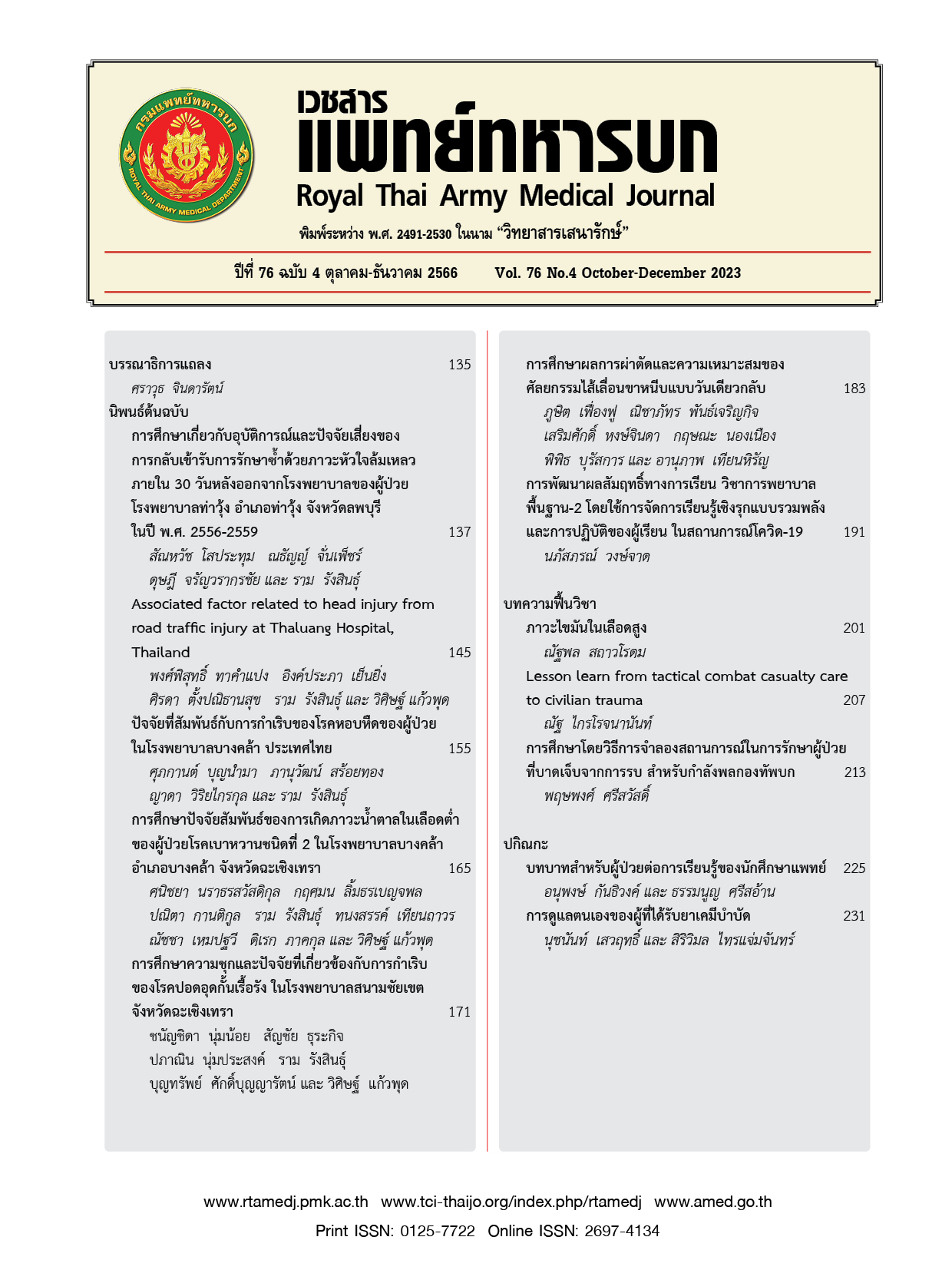การศึกษาเกี่ยวกับอุบัติการณ์และปัจจัยเสี่ยงของการกลับเข้ารับการรักษาซ้ำ ด้วยภาวะหัวใจล้มเหลวภายใน 30 วันหลังออกจากโรงพยาบาลของผู้ป่วยโรงพยาบาลท่าวุ้ง อำเภอท่าวุ้ง จังหวัดลพบุรี ในปี พ.ศ. 2556-2559
Main Article Content
บทคัดย่อ
ที่มาและความสำคัญ ภาวะหัวใจล้มเหลวเป็นหนึ่งในปัญหาสุขภาพและเศรษฐกิจที่สำคัญของประเทศไทยสอดคล้องกับนานาชาติ และการศึกษาถึงการกลับเข้ารับการรักษาซ้าในโรงพยาบาลของผู้ป่วยภาวะหัวใจล้มเหลวยังมีไม่มากนัก และทั้งหมดเป็นงานวิจัยในโรงพยาบาลระดับตติยภูมิ ยังไม่มีการศึกษาใดในโรงพยาบาลระดับทุติยภูมิมาก่อน อีกทั้งภาวะดังกล่าวเป็นสาเหตุการตายและการนอนโรงพยาบาลลำดับต้นๆ ในโรงพยาบาลท่าวุ้ง วัตถุประสงค์ เพื่อหาอุบัติการณ์และปัจจัยเสี่ยงของการกลับเข้ารับการรักษาซ้ำของภาวะหัวใจล้มเหลว เพื่อใช้ในการประเมินและลดความเสี่ยง รวมทั้งลดค่าใช้จ่ายที่ใช้กับภาวะหัวใจล้มเหลวของโรงพยาบาล วัสดุและวิธีการ เป็นการวิจัย แบบ Retrospective Cohort Study โดยใช้ข้อมูลทุติยภูมิจากฐานข้อมูลผู้ป่วยที่นอนโรงพยาบาลครั้งแรกด้วยเรื่องหัวใจล้มเหลวทุกรายที่เคยเข้ารับการรักษาเป็นผู้ป่วยในโรงพยาบาลท่าวุ้ง จังหวัดลพบุรี และได้รับการบันทึกอยู่ในระบบฐานข้อมูลของโรงพยาบาล ในช่วงเวลาตั้งแต่ 1 มกราคม พ.ศ. 2556 ถึง 30 มิถุนายน พ.ศ. 2559 วิเคราะห์ข้อมูลทั้งหมดโดยการใช้สถิติเชิงพรรณนาสถิติ Survival analysis วิเคราะห์ระยะปลอดเหตุการณ์ โดยอาศัย Kaplan-Meier risk estimate และใช้สถิติ Cox proportional hazards regression เพื่อหาปัจจัยเสี่ยงที่ทาให้ผู้ป่วยภาวะหัวใจล้มเหลวต้องกลับมารักษาซ้ำหลังจากจำหน่ายออกจากโรงพยาบาลภายใน 30 วัน ผลการศึกษา อุบัติการณ์ของการกลับมารักษาซ้ำหลังจำหน่ายออกจากโรงพยาบาลภายใน 30 วัน ทั้งหมด 19 ราย จาก 164 ราย คิดเป็นร้อยละ 11.6 คำนวณ Cumulative event-free probability = 0.87 ที่ 30 วัน และ 0.65 ที่วันสิ้นสุดการศึกษา มีผู้ป่วยที่ไม่มีข้อมูลสาเหตุถึงร้อยละ 68.9 ได้รับการทำ Echocardiogram ร้อยละ 27.4 และมีข้อมูลเก็บเพียงร้อยละ 33 ปัจจัยเสี่ยงที่ทำให้ ผู้ป่วยกลับเข้ารับการรักษาซ้ำได้แก่ โรคไตวายเรื้อรัง (Hazard ratio in readmission group, 10.83; 95% Confidential Interval: 3.51-33.46; p < 0.001) อายุน้อยกว่า 60 ปี (HR = 3.15; 95%CI: 1.02-9.77 p = 0.047) การนอนโรงพยาบาลนานมากกว่า 5 วัน (HR = 4.49; 95%CI: 1.19-17.0; p = 0.027) การได้รับยา Clopidogrel (HR = 5.68; 95%CI: 1.87-17.31; p = 0.002) และการ ได้รับยา Warfarin (HR = 21.18; 95%CI: 3.18-141.22 p = 0.002) สรุป ผู้ป่วยภาวะหัวใจล้มเหลวมีโอกาสที่จะกลับมานอนโรง พยาบาลภายใน 30 วันร้อยละ 11.6 แนวโน้มสูงขึ้น ปัจจัยเสี่ยงที่ทำให้ผู้ป่วยกลับมารับการรักษาซ้ำได้แก่ ผู้ป่วยที่มีอายุน้อยกว่า 60 ปี ผู้ป่วยที่นอนโรงพยาบาลนานมากกว่า 5 วัน ผู้ป่วยที่ได้รับยา Clopidogrel ยา Warfarin และผู้ป่วยโรคไตเรื้อรัง
Downloads
Article Details

อนุญาตภายใต้เงื่อนไข Creative Commons Attribution-NonCommercial-NoDerivatives 4.0 International License.
บทความในวารสารนี้อยู่ภายใต้ลิขสิทธิ์ของ กรมแพทย์ทหารบก และเผยแพร่ภายใต้สัญญาอนุญาต Creative Commons Attribution-NonCommercial-NoDerivatives 4.0 International (CC BY-NC-ND 4.0)
ท่านสามารถอ่านและใช้งานเพื่อวัตถุประสงค์ทางการศึกษา และทางวิชาการ เช่น การสอน การวิจัย หรือการอ้างอิง โดยต้องให้เครดิตอย่างเหมาะสมแก่ผู้เขียนและวารสาร
ห้ามใช้หรือแก้ไขบทความโดยไม่ได้รับอนุญาต
ข้อความที่ปรากฏในบทความเป็นความคิดเห็นของผู้เขียนเท่านั้น
ผู้เขียนเป็นผู้รับผิดชอบต่อเนื้อหาและความถูกต้องของบทความของตนอย่างเต็มที่
การนำบทความไปเผยแพร่ซ้ำในรูปแบบสาธารณะอื่นใด ต้องได้รับอนุญาตจากวารสาร
เอกสารอ้างอิง
Gheorghiade M, Vaduganathan M, Fonarow GC, Bonow RO. Rehospitalization for Heart Failure: Problems and Perspectives. J Am Coll Cardiol. 2013;61(4):391-403.
Ambrosy AP, Fonarow GC, Butler J, Chioncel O, Greene SJ, Vaduganathan M, et al. The
global health and economic burden of hospitalizations for heart failure: lessons
learned from hospitalized heart failure registries. J Am Coll Cardiol. 2014;63(12):1123–33
Cook C, Cole G, Asaria P, Jabbour R, Francis DP. The annual global economic burden of heart failure. Int J Cardiol. 2014;171(3):368-76.
Potisat S, Cooney N, Udomchairat R, Preechachaiyawit P, Konlaeard S, Miratanaprai S, et al. [Literature Review: The current situation and care model of non-communicable diseases]. Bangkok: Institute of Medical Research and Technology Assessment : IMRTA;2014. Thai.
Jenghua K, Jedsadayanmata A. Rate and predictors of early readmission among Thai patients with heart failure. J Med Assoc Thai. 2011;94(7):782-8.
Laothavorn P, Hengrussamee K, Kanjanavanit R, Moleerergpoom W, Laorakpongse D, et al. Thai Acute Decompensated Heart Failure Registry (Thai ADHERE). CVD Prevention and Control. 2010;5:89-95.
Tha Wung hospital. [Tha Wung hospital death rate]. Lopburi, Thailand: Tha Wung hospital; 2016. Thai.
Bui AL, Horwich TB, Fonarow GC. Epidemiology and risk profile of heart failure. Nat Rev Cardiol. 2011;8(1):30-41.
Noori A, Shokoohi M, Baneshi MR, Naderi N, Bakhshandeh H, Haghdoost AA. Impact of socio-economic status on the hospital readmission of Congestive Heart Failure patients: a prospective cohort study. Int J Health Policy Manag. 2014;3(5):251-7.
Krumholz HM, Parent EM, Tu N, Vaccarino V, Wang Y, Radford MJ, et al. Readmission after hospitalization for congestive heart failure among Medicare beneficiaries. Arch Intern Med. 1997;157(1):99-104.
Yancy CW, Lopatin M, Stevenson LW, De Marco T, Fonarow GC; ADHERE Scientific Advisory Committee and Investigators. Clinical presentation, management, and in-hospital outcomes of patients admitted with acute decompensated heart failure with preserved systolic function: a report from the Acute Decompensated Heart Failure National Registry (ADHERE) Database. J Am Coll Cardiol. 2006;47(1):76-84.
Shiba N, Shimokawa H. Chronic heart failure in Japan: implications of the CHART studies. Vasc Health Risk Manag. 2008;4(1):103-13.
Okura Y, Ramadan MM, Ohno Y, Mitsuma W, Tanaka K, Ito M, et al. Impending epidemic: future projection of heart failure in Japan to the year 2055. Circ J. 2008;72(3):489-91.


